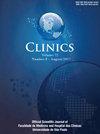Kynurenine promotes the immune escape of colorectal cancer cells via NAT10-mediated ac4C acetylation of PD-L1
IF 2.4
4区 医学
Q2 MEDICINE, GENERAL & INTERNAL
引用次数: 0
Abstract
Background
This study aimed to investigate the role of kynurenine in Colorectal Cancer (CRC) and the underlying mechanism.
Methods
Enzyme-linked immunosorbent assay was employed to assess the kynurenine concentration. Flow cytometry was utilized to analyze the percentages of CD3+CD4+ and CD3+CD8+ T-cells. Immunofluorescence was used to measure the expression of Programmed Death-Ligand 1 (PD-L1). RNA modification levels in CRC cells were analyzed using a dot blot assay. The interaction between NAT10 and PD-L1 was assessed via RNA immunoprecipitation, dual-luciferase reporter, and immunofluorescence assays. A xenograft tumor rat model was established.
Results
Results indicated that kynurenine suppressed T-cell activation and promoted immune escape. Besides, kynurenine promoted N-Acetyltransferase 10 (NAT10)-mediated N4-acetylcytidine (ac4C) modification. Moreover, NAT10 inhibition improved T-cell activation and suppressed immune escape. Mechanically, NAT10 is bound with the mRNA of PD-L1. Rescue experiments showed that PD-L1 inhibitor treatment reversed the suppressed T-cell activation and the promoted immune escape induced by NAT10 overexpression. In vivo, studies indicated that NAT10 deficiency reversed the promoted tumor growth induced by kynurenine treatment.
Conclusion
In conclusion, kynurenine promoted the immune escape of CRC cells via NAT10-mediated ac4C acetylation of PD-L1.
犬尿氨酸通过nat10介导的PD-L1的ac4C乙酰化促进结直肠癌细胞的免疫逃逸
本研究旨在探讨犬尿氨酸在结直肠癌(CRC)中的作用及其机制。方法采用酶联免疫吸附法测定犬尿氨酸浓度。流式细胞术分析CD3+CD4+和CD3+CD8+ t细胞百分比。免疫荧光法检测程序性死亡配体1 (PD-L1)的表达。用点印迹法分析结直肠癌细胞中的RNA修饰水平。通过RNA免疫沉淀、双荧光素酶报告基因和免疫荧光测定来评估NAT10和PD-L1之间的相互作用。建立异种移植瘤大鼠模型。结果犬尿氨酸抑制t细胞活化,促进免疫逃逸。此外,犬尿氨酸促进n -乙酰基转移酶10 (NAT10)介导的n4 -乙酰胞苷(ac4C)修饰。此外,抑制NAT10可改善t细胞活化,抑制免疫逃逸。机械地,NAT10与PD-L1的mRNA结合。救援实验表明,PD-L1抑制剂治疗逆转了NAT10过表达诱导的t细胞活化抑制和免疫逃逸促进。在体内,研究表明,NAT10缺乏逆转了犬尿氨酸治疗诱导的促进肿瘤生长。结论犬尿氨酸通过nat10介导的ac4C乙酰化PD-L1促进结直肠癌细胞的免疫逃逸。
本文章由计算机程序翻译,如有差异,请以英文原文为准。
求助全文
约1分钟内获得全文
求助全文
来源期刊

Clinics
医学-医学:内科
CiteScore
4.10
自引率
3.70%
发文量
129
审稿时长
52 days
期刊介绍:
CLINICS is an electronic journal that publishes peer-reviewed articles in continuous flow, of interest to clinicians and researchers in the medical sciences. CLINICS complies with the policies of funding agencies which request or require deposition of the published articles that they fund into publicly available databases. CLINICS supports the position of the International Committee of Medical Journal Editors (ICMJE) on trial registration.
 求助内容:
求助内容: 应助结果提醒方式:
应助结果提醒方式:


